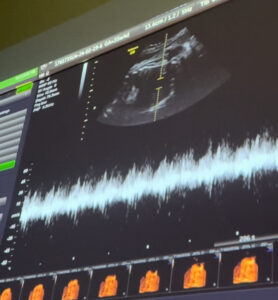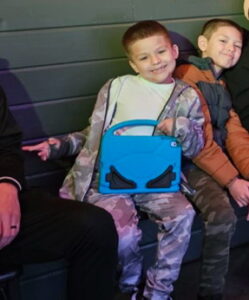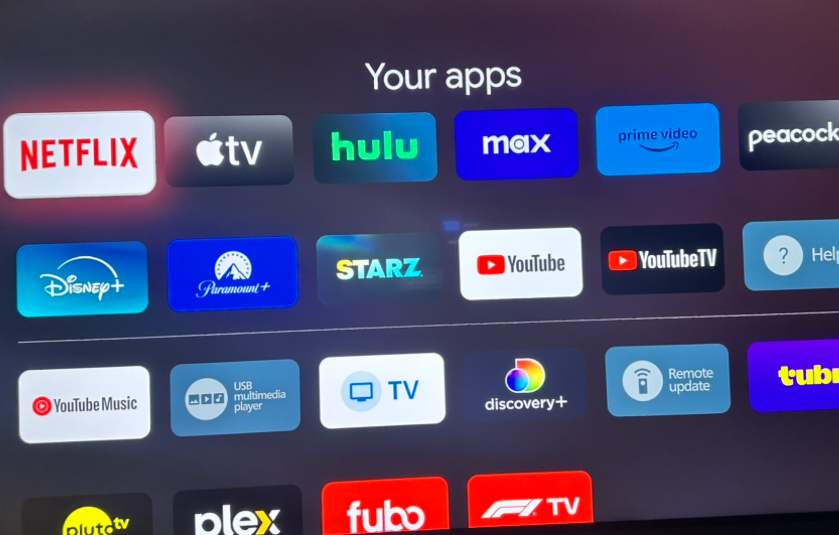Media has played a big role in our lives since before we were out in the world. At 36 weeks pregnant, my mom and I gave my sister a surprise 3D sonogram trip so that we could see my nephew before he made his worldly debut. Though he did make it difficult to actually get a good look at him in there, getting to experience that alongside my sister and mom is something I’d never forget. We were able to get a keepsake video of sonogram and photos, too.


Media can be a life-saving tool used for children, even in the delivery room. I’m grateful for what was done for my sister and nephew during this nerve-racking time, and I’m grateful for the technology and media used to keep both of them alive and well. When used in a correct way for children, it can blossom into something incredible for them.
According to California’s Department of Education 1, birth to age three are the most important years in a child’s development. So why are we putting these developing brains in front of screens for hours on end? During the COVID-19 Pandemic, children’s screen time increased nearly two hours, according to a new analysis in JAMA Network Open by Kaiser Permanente researchers.2
The American Academy of Pediatrics (AAP) states that media exposure for children two years and younger can be very harmful to their limited memory, attention, and cognition. Though some have argued, that exposure to educational media can cause no harm and can be beneficial the AAP still does not recommend it. 3 Early media exposure can cause a disconnect between child and parent which in turn causes communication and social skill delays in children. Continuously receiving negative exposure can cause Autism Spectrum Disorder (ASD) like symptoms, which hinders the necessary skills needed to learn for children to play, communication and socialize with family, friends and others.
Not only is their a negative effect on children’s mental development but also on their physical development as well, children who use some type of media without a time controlled environment tend to create unhealthy sleep habits; causing cognitive delays and issues that then effect different aspects of their lives such and school and education. Along with inconsistent sleep schedules, a unhealthy relationship with food could also be an outcome with the unbalanced use of media. Snacking and the use of some sort of technology is a very common pastime, but when their a balance of activity in the mix it can lead to unhealthy weight gain which can cause long term effects on children such as diabetes, high blood pressure, high cholesterol, etc. 4
When is media is used correctly, it can be a successful learning tool to help children thrive throughout their lives. Media not only allows children to connect with the real world through research but also provokes them into conversations about topics learned and research through media. While working with children who are on the Autism Spectrum, media is a big tool used to communicate with the child and to engage them in their daily routine. Media is used differently for each child but allows them to learn in ways they are comfortable with. Media is used as a type of stimulation that helps create a consistent routine that is both easy and effective for them to follow. 5When used correctly, media can help children’s development thrive in a healthier, less technology-dependent way. 6

When media is used as a source to keep children busy, quiet, or still, that is when it becomes harmful to a child’s development. Children under the age of two are not learning anything from screens, says Stephanie Pappas, author of “What do we really know about kids and screens?” 7When children put themselves in front of a screen, the majority of the time it is not used for educational purposes, and when parents put their children in front of a screen, it most likely has to do more with not having to deal with the child’s erratic behavior.
Children’s development is crucial from the day they are born; children’s brains start registering outside information from the age of two. 8 Media can go in either direction for children. It’s up to parents, guardians, and loved ones to choose what direction it goes. With a guiding hand, media can be a wonderful source of success but can also be a tool of hindering it as well. This is why I’ll always be grateful for the media used to save my nephew’s life and cautious about the media he begins to use as he grows and develops.

- California Department of Education. “Ages and Stages of Development – Child Development.” Accessed February 15, 2024. https://www.cde.ca.gov/sp/cd/re/caqdevelopment.asp. ↵
- Greene, Jan. “Children’s Pandemic Screen Time Rose Nearly 2 Hours per Day.” Kaiser Permanente Division of Research, July 6, 2023. https://divisionofresearch.kaiserpermanente.org/childrens-pandemic-screen-time-rose/. ↵
- Sung Koo Kim, Da Som Wi, and Kyung Mi Kim, “Effect of Media Exposure on Social Development in Children,” Global Pediatric Health 10 (January 1, 2023): 2333794X2311592, https://doi.org/10.1177/2333794×231159224. ↵
- “How Media Use Can Affect Kids (for Parents),” n.d., https://kidshealth.org/en/parents/tv-affects-child.html. ↵
- Using Media to Enhance Teaching and Learning. “Why Use Media to Enhance Teaching and Learning.” Accessed February 16, 2024. https://serc.carleton.edu/sp/library/media/why.html. ↵
- Using Media to Enhance Teaching and Learning. “Why Use Media to Enhance Teaching and Learning.” Accessed March 15, 2024. https://serc.carleton.edu/sp/library/media/why.html. ↵
- Pappas, Stephanie. “What Do We Really Know About Kids and Screens?” American Psychological Association, Accessed March 15, 2024. https://www.apa.org/monitor/2020/04/cover-kids-screens. ↵
- North Carolina Department of Health and Human Services. “Why Early Childhood Matters.” Accessed March 15, 20024. https://www.ncdhhs.gov/about/department-initiatives/early-childhood/why-early-childhood-matters. ↵




5 comments
Gaitan Martinez
I’m a relatively new uncle as well, my baby niece was born in September 2023. Already I can see how damaging technology can be because as my brother and I get on our phones while watching our niece, her eyes will immediately be glued to the screen! It’s crazy because I didn’t think a baby would care about something she didn’t know about, but I guess it’s the mystery that intrigues her.
Mariana Chamorro
Samantha, your publication beautifully captures the significance of media in childbirth and its influence on childhood development. Your story of your sister’s labor experience shows the important role of technology in ensuring both mother and child’s health during such a crucial time. Such a beautiful and captivating story. Great job!
Rhys Williams
I found your discussion on the impact of media exposure on young children both enlightening and thought-provoking. The quote from the American Academy of Pediatrics (AAP) regarding the harmful effects of media exposure on children under two years old underscores the importance of considering the potential consequences of early media consumption on cognitive development and social skills.
LEE
I like this article. This article shows great effort and information about the topic. During child hood media is very important. It is better for kids to try not to use as much as media device if possible. Because it can ruin life pattern and they often have bad information for young kids. Thank you for writing such a nice and well organized article.
Madison Hinojosa
I loved reading this article! The way it was written grabbed my attention, and your nephew is just so adorable. I completely resonate with the point you were making regarding screen time. It’s a topic I feel strongly about as well. I agree that excessive screen time can have a lasting impact on children as they grow up, shaping their behaviors and habits. However, I do think there are certain situations where screen time can be beneficial, such as educational programs or virtual learning experiences. Overall, I found your argument to be very compelling and thought-provoking. Thank you for sharing such an insightful article!